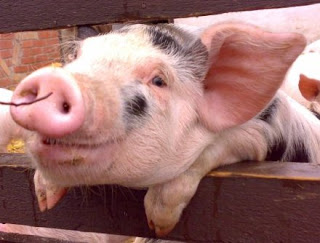One day my mum was turned into a pig, and this sorry tale of parental deception and childly despair can teach us, I believe, a few things about young children’s sense of humour (or lack thereof) and their complex relationship to reality, fiction, and ‘jokes’.
At four and a half years old I was sent to a holiday skiing camp somewhere in the Alps. It wasn’t the first time I was separated from my parents, and though it wasn’t the best thing ever, I was dealing with it fine, apparently (I have no memories of it) (I now hate skiing, though).
One afternoon, the Head of the holiday camp found me in tears under a table. I wouldn’t budge, so she had to drag me out, but I stayed resolutely silent and it took time and several adults to cajole me, eventually, into tell them what was wrong.
What was wrong was that I’d just received a postcard from my dad. I’d been a fluent reader for a while by then, so I hadn’t asked anyone to read the postcard to me; and that was what the postcard said:
‘Hi, my darling! hope you’re having fun! guess what – a naughty fairy’s turned Mummy into a pig! but don’t worry, I feed her every day. Love, Dad’
The front of the postcard, adequately, was a photograph of a cute little pink piggy. (They've kept it. We still have it at home. They treasure it, the traumatic object.)
I’d believed every single word of it. Even though I was already a proficient reader, even though I had more than a little experience living with my father's weird jokes, I’d been completely unable to recognise that it was humour.
Of course my parents got a furious phone call from the Head, who implied they had to be completely mental to send letters like that to their four-year-old daughter; and then my dad (who was by then in tears with laughter) got a mighty telling-off by my mum, who felt extremely guilty, especially as she’d told him not to do it because I might not get the humour, but then had eventually let him do it anyway.
Eventually, they had to call my mother at work, who assured and reassured me, in the open space and in front of all her colleagues, that she hadn't in fact been turned into a pig (oh! I would so have liked to witness that scene. The pretty blonde female middle-manager, whispering into a phone, "I haven't been turned into a pig, my darling. I haven't, I promise.".)
That’s a pretty good example, I think, of a rather dramatic ‘child really not getting the joke’ episode. Ironically, if I hadn’t been a reader yet, the postcard would have been read to me by an adult, who would have explained that it was a joke. But because no one could imagine that a letter from a nice daddy would contain such completely inappropriate humour, they left the four-year-old reader to her own unsophisticated reading skills, at her peril.
The day my mum was turned into a pig, I probably learnt more about the dangers of reading and imagination than any other day of my life until then. Or since.
(Yeah, then I wrote a book called Piglettes, I know. Purely coincidental, I promise.)
-----------------------------------
Clémentine Beauvais is a writer and literary translator. Her YA novels are Piglettes (Pushkin, 2017) and In Paris with You (trans. Sam Taylor, Faber, 2018).



4 comments:
Brilliant blog, Clementine. I love your blogs and I don't want to offend you so I'd better keep my silence on your parents.
Poor little four-year-old you! So glad she wasn't...
What a horrible moment for little you, Clementine and so far away from home!
The incident reminds me of a difficulty that occasionally crops when I've been involved in reading a Writing Group's Children's Story Competition. Some people do not understand that writing about children - especially those "little misunderstandings" that seem so charming/hilarious to the adults involved - is not at all the same as writing from the viewpoint and interests of the story child's character - or the young reader.
Hopefully this will teach you not to learn to read before the approved date!
Post a Comment